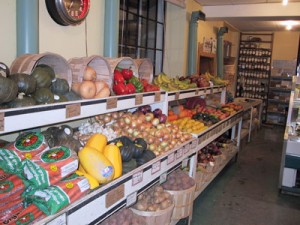Readers of Mysteries of Canada will know that Canadian history is not always old and dusty. Sometimes old is not so old. Such is the case with a food co-op I was introduced to recently in Toronto. The Karma Co-op is tucked away down an alley and stuck between two houses at 739 Palmerston Avenue in Toronto. From the outside the store looks tiny but not so on the inside.

The co-op was started in 1972 and was the first food co-op established in Toronto.
People in western Canada know about co-op stores. Westerners join them, buy their stuff there and at the end of the year they get back a refund. There is really no participation in the running of the stores for most members. Not so with the Karma Co-op.
Karma is a member-owned and operated co-operative food store that emphasizes organic and local foods and environmentally friendly household products. Any profits that are made go back into improving the store and other member benefits. This helps keep prices low compared to many grocery and health food stores. In addition, you can get credit for volunteering to work at the store, usually a few hours per month on the cash or cleaning up.
Karma is choosy about the products they carry. They have Food Issues Committee who oversees a Product Policy. The policy is based on a series of considerations:
Political and economic considerations:
Our decisions to buy products are also decisions to support those who produce and distribute them, to ensure their continuing presence in our communities. Large, remote corporations can too easily lose the ability to balance business and community concerns; foreign businesses, however well-intentioned, will not reinvest their profits in our own communities. Our own co-operative also must achieve such a balance, remaining both financially healthy and true to its principles. Accordingly,
- We strongly support local, regional, and Canadian producers.
- We strongly support small, co-operative, and community businesses, rather than large, multinational corporations or their subsidiaries.
- We strongly support stocking products that are affordable by members with limited income, while not rejecting products that, while affordable by only some members, contribute to the store’s economic well-being.
Environmental considerations:
Our decisions to buy products are also decisions to support physical systems of production and distribution, with consequences that can be destructive, benign, or beneficial to the natural environment. Organic production addresses these issues for the farmers, the primary producers, but similar issues arise at the stages of processing, packaging, and distribution, where there are fewer clearly accepted standards of conduct. Accordingly,
- We strongly support the principles of organic agriculture, especially from farms certified as such, but also from farms in transition or from those avoiding pesticides without seeking certification.
- We support environmentally and personally safe alternatives to the dangerous chemicals sometimes used for personal hygiene, household cleaning, and pest control.
- We oppose wasteful packaging, especially when there is no effective way to biodegrade or recycle what cannot be reused.
- We oppose the transportation of products from distant sources when locally-produced alternatives are available.
- We strongly oppose the use of irradiation in food preservation.
- We condemn the genetic modification of plants and animals.
Ethical considerations:
Our decisions to buy products are also decisions to support relationships with the human and animal inhabitants of our communities. Inexpensive, widely available products should not be obtained at the cost of exploitation and pain: those ends cannot justify those means. Accordingly,
- We strongly support other organizations with an explicit and positive social and environmental commitment.
- We strongly support initiatives to ensure that primary producers are paid fair prices for their products.
- We strongly support the raising of animals in free-range conditions without growth hormones or other unnecessary drugs.
- We condemn the raising and slaughtering of animals under inhumane conditions.
- We condemn testing products for toxicity by using animals.
- We condemn the exploitation oflabour.
- We condemn the ownership and patenting of genetic material.
Nutritional and health considerations:
Our decisions to buy products are also decisions to bring products and their chemical constituents, natural and otherwise, into our homes and our bodies. Whether we prefer traditional or modern diets, whether our bodies tolerate a wide or a narrow range of food, we require that food to be of high quality, nutritious, and honestly described. Accordingly,
- We strongly support the provision of full, accurate information through ingredient labels and signs.
- We strongly support the production of minimally-processed, whole foods.
- We oppose the use of artificial chemical additives or preservatives.
As an observer of politics, worldwide, I note that most, if not all, the considerations listed above represent very progressive issues that our politicians should review when creating their policies. While this list is constantly being updated, remember that Karma goes back to 1972, when political correction was not in vogue.
I am not a member of Karma. I live in the wrong city. If I was in Toronto, I would be a member; not only for the good prices but also for the progressive considerations.
Karma Co-op is as part of our Canadian history (and future); as important as Riel, MacDonald and the BNA.
Leave a Reply